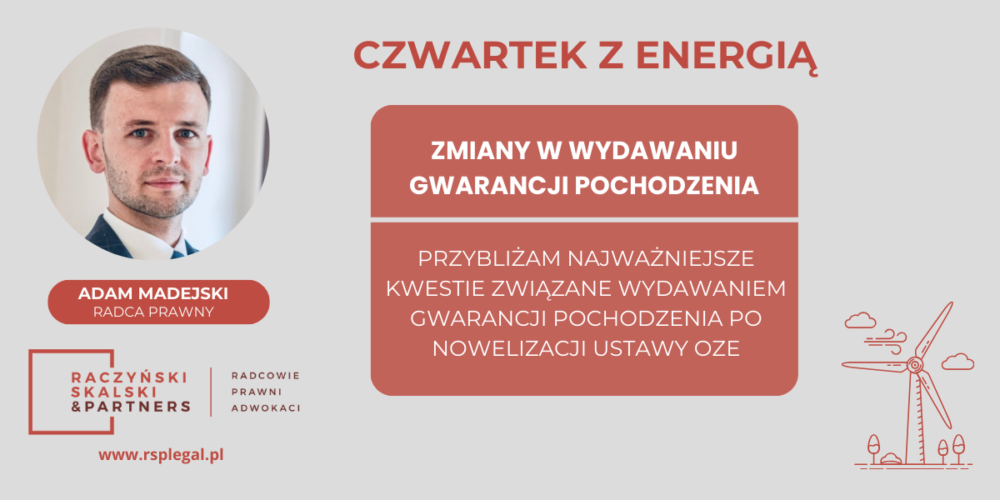The amendment to the Renewable Energy Sources Act’s provisions on guarantees of origin has become a reality – as of 1 January 2024, new rules apply for the issuing and trading of guarantees of origin, which can now be issued not only for electricity, but also for other energy carriers such as biogas, biomethane, heat and cold or renewable hydrogen.
Such a significant change in the law has also affected the process of applying for guarantees of origin for renewable energy generators. In today’s post, I will explain the step-by-step process of how to apply for a guarantee of origin and how to avoid the most common mistakes that may cause negative consequences for the generator, including the loss of the right to obtain a guarantee of origin.
New guarantee of origin application form
The template for the guarantee of origin application, developed by the Energy Regulatory Office, has been significantly amended. Due to the expansion of the catalogue of energy carriers covered by the guarantee of origin regime and the introduction of the institution of an accredited unit, it was necessary to introduce the necessary changes.
The general rules for applying for guarantees of origin have not been modified – the generator submits the application to the President of the Energy Regulatory Office, but through a competent distribution/transmission system operator or an accredited unit (Article 121(2) of the Renewable Energy Sources Act, hereinafter the ‘RES Act’). The application is then examined with regard to the conformity of the measurement data provided, as the data held by the operator or established by the accredited body are decisive in this respect (Article 121(5) of the RES Act).
It should be remembered that the right to apply for a guarantee of origin is time-limited in the following framework:
-
-
- the application must be submitted within 30 days of the end of the period covered by the application (Article 121(2) of the RES Act),
- the application may only relate to monthly periods (Article 121(3)(4) of the RES Act),
- one application may cover a period of up to 6 consecutive months (Article 121(3)(4) of the RES Act).
-
The amount of energy covered by the application should be given with an accuracy of one megawatt hour rounded down. The application verified by the system operator or accredited unit is forwarded to the President of the Energy Regulatory Office, who has 30 days to consider it, with the time limit calculated from the receipt of a complete application (Article 122(2) of the RES Act). Within this period, if it finds any deficiencies, it shall summon the generator to supplement them under pain of leaving the application unprocessed (Article 122(1) of the RES Act).
A new element is the template for the application for the issuance of a guarantee of origin published by the ERO on 29 December 2023, and which is available at https://www.ure.gov.pl/pl/oze/gwarancje-pochodzenia/11543,Odnawialne-zrodla-energii-od-1-stycznia-2024-r-wnioski-o-wydanie-gwarancji-pocho.html.
The new elements are:
-
-
- the extension of the catalogue of carriers and types of energy, in accordance with the new definition of guarantees of origin adopted in Article 120(1) of the RES Act,
- inclusion of an accredited body as an entity authorised to verify the correctness of the data provided by the generator in the application, in accordance with the current wording of the RES Act,
- removal of the information on the estimated value of greenhouse gas emissions, which, according to the new definition of the guarantee of origin, is no longer information to be confirmed by issuing a guarantee of origin.
- Introduction of information on the individual identification number of the installation generated by the online auction platform – this information is only provided if the installation has such a number.
-
Changes to the procedure for obtaining guarantees of origin
The amendment to the provisions of the RES Act has introduced quite a wide range of changes, the most important of which are:
-
-
- extending the period during which guarantees of origin can be cancelled – from 12 to 18 months. It is worth bearing in mind that the validity period of the guarantee has not changed and is still 12 months. This means that it is only possible to trade guarantees of origin for a period of 12 months, but redemption can be done in a period of six months longer. All periods indicated should be counted from the date of completion of the generation of energy covered by the guarantees of origin, and not from the issuance of these guarantees. Failure to redeem the guarantees of origin within the statutory period results in their expiry and thus their validity (Art. 122(3)-(4) of the RES Act).
- in the event that the energy produced in a RES installation is subsequently used to produce another type of energy (e.g. renewable hydrogen) within the framework of a so-called energy conversion, then the amount of such energy is included in the guarantees of origin, which are immediately redeemed when the producer applies for guarantees of origin for the new energy carrier or type of energy (Article 120(7) and (8) of the RES Act).
- Guarantees of origin issued in another country of the European Union, the Energy Community, the EEA or the Swiss Confederation may be recognised in Poland and entered in the Guarantees of Origin Register maintained by the Polish Power Exchange only if they are recognised by the President of the ERO after the holder submits an application with contents compliant with the requirements contained in the RES Act (Article 124(10) of the RES Act).
- The process of cancelling the guarantee of origin has become more formalised – the application for cancellation gives the details of the entity (name, address, legal form, nature of the recipient – energy company or end-user) for which the cancellation is being made, as well as the reason for cancellation (either as part of energy conversion or not) (Article 124(4)-(6) of the RES Act).
-
Summary
The amendment of the RES Act’s provisions has brought about a rather wide range of changes. As the importance of guarantees of origin and their value are constantly increasing, every generator should remember to comply with the legal requirements necessary to obtain a guarantee of origin. Practice shows that most often the guarantees of origin are issued for quarterly and longer periods, therefore the possible failure of a generator to obtain a guarantee of origin may have very painful consequences – from the loss of earnings from sales to the emergence of contractual liability towards end customers or other entities with which the generator has concluded a contract for the sale or redemption of the guarantee of origin.



